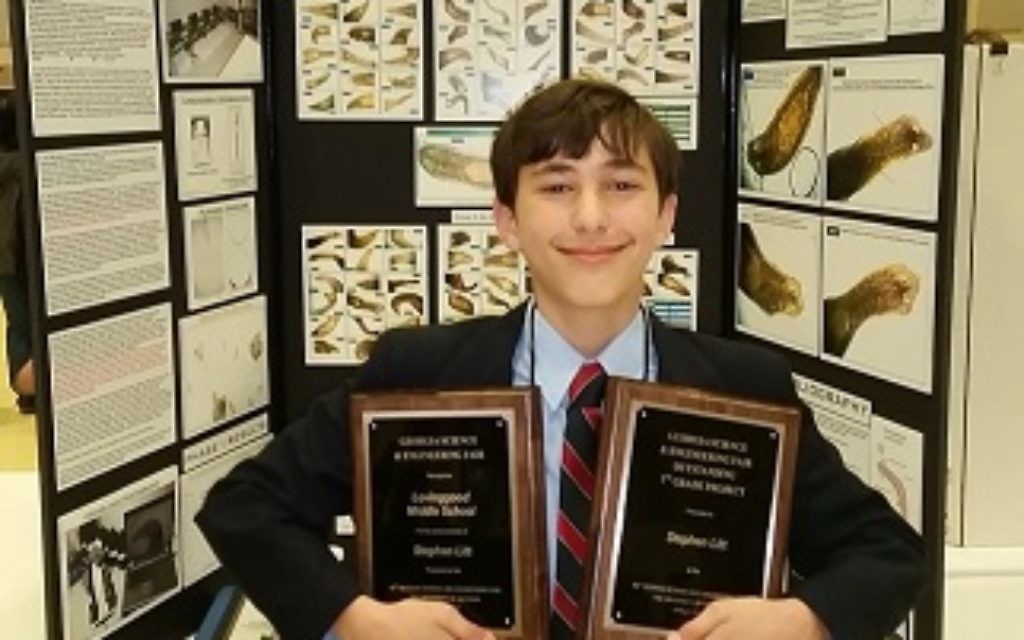12-Year-Old Makes Cancer Discovery
A Cobb County seventh grader discovers antioxidant in green tea which inhibits the growth of tumors.

For most seventh-graders, a science fair project involves something on the complexity and importance of measuring the speed of an egg shell’s erosion in different substances. Lovinggood Middle School seventh-grader Stephen Litt, however, devoted his project to discovering an antioxidant that could prevent the formation of breast cancer tumors.
“I wanted to work on a science project that was different and important. I wanted to do something that would help people,” the Cobb County 12-year-old said. “Far too often, cancer research is overlooked, and yet it is an ongoing issue which continues to have an impact on society. We all know cancer is deadly, and I am helping to fight it.”
To conduct his research, Stephen tested a polyphenol, an antioxidant in green tea also known as EGCG, to determine whether it could inhibit tumor regrowth in planaria, a type of flatworm.
Get The AJT Newsletter by email and never miss our top stories Free Sign Up
Stephen found evidence proving his hypothesis that the antioxidant would inhibit tumor growth and has since garnered national media attention.
“You wouldn’t think something in green tea had any relation to cancer, but my test proved otherwise,” Stephen said.
Going forward, Stephen hopes to carry out his research on carcinogens or more advanced organism such as rodents to see whether EGCG is just as effective within their immune systems.
In the meantime, Stephen juggles a schedule practicing the oboe, participating in karate, tennis and the Boy Scouts, and preparing for his bar mitzvah celebration at Temple Kol Emeth.
“It’s been a bit challenging, as I can’t study when I need to study or practice when I need to practice, but in the end it all works out,” he said.
For his bar mitzvah project, which began with the science fair project, Stephen is trying to raise $500 for the Atlanta 2-Day Walk for Breast Cancer and will walk Nov. 11 and 12 with Kol Emeth’s team, the Boobulahs. The proceeds will remain in Georgia to promote further breast cancer programs.
Stephen is also scheduled to speak during the 2-Day Walk at the request of the event’s director. Donations can be made at bit.ly/2qinh5G.
“It was all very surprising at first,” Lesley Litt said about his son’s scientific accomplishments, “but my wife (Melanie) and I are very proud of Stephen and are curious to see what path he ends up taking. Science, math, whatever he ends up choosing, we know he will inevitably find a way to enjoy it.”
In addition to the attention from such media outlets as CNN, ABC and CBS, Stephen was invited by a Tufts University professor to explain his research in greater detail and to receive a tour of the campus.
Some of Stephen’s classmates are eager to follow in his footsteps with their own projects, but his father mentioned obstacles to doing so. “I think Stephen grew an interest in science by default,” Litt said. “His mom is a dentist, and we are always discussing interesting topics at home. However, Cobb County does not encourage enough science and math programs or promote them within middle schools, which is very disappointing.”
Stephen faces an age-related obstacle to continuing his own research. Finding the right facility and necessary equipment is daunting.
“We have an interesting challenge since universities and college campuses won’t let anyone under 14 use equipment,” his father said. “However, we will try to see if we can move his lab to a college laboratory instead and take up a small amount of space.”
Lesley Litt expressed optimism for women battling breast cancer. “The most important thing to remember is to not lose hope. We have seen plenty of women who have survived and have come out of it, yet it is imperative they continue to get mammograms and are proactive in getting genetic testing.”




comments